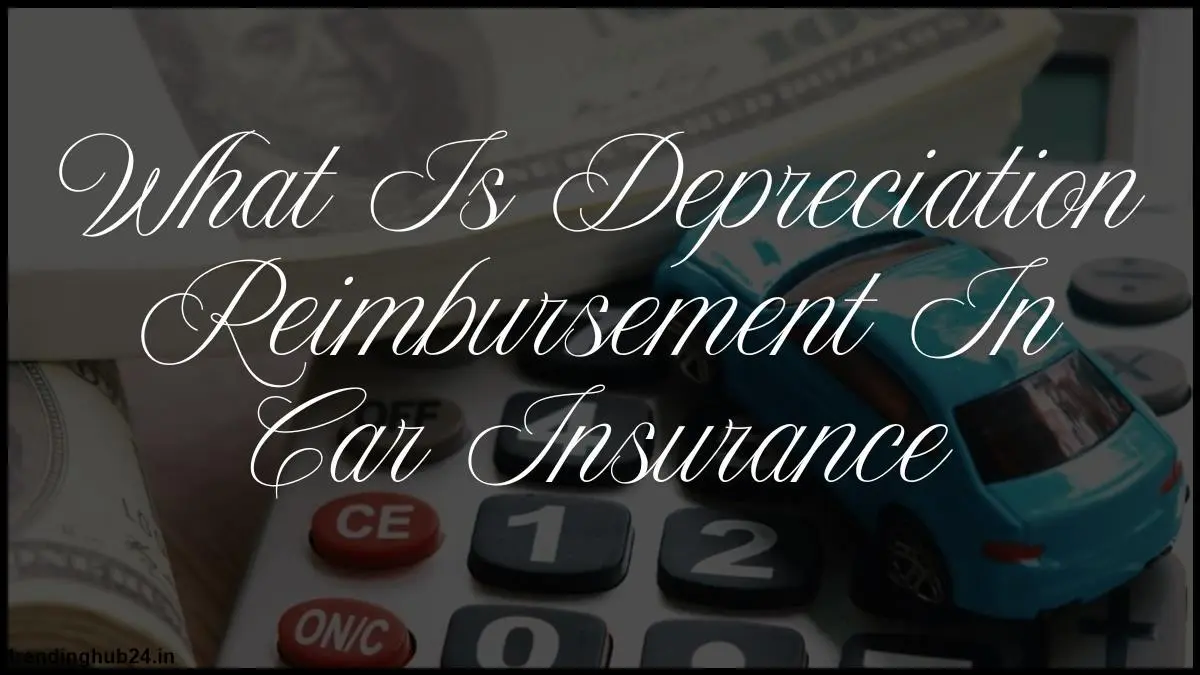🚀 Become a Verified Author on Trending Hub24
✍️ Author Account Available @ $60 / Month | +91 7355993756
What Is Depreciation Reimbursement In Car Insurance

What is depreciation reimbursement in car insurance? It is an optional car insurance add-on that protects your vehicle's value in the event of a claim.
Table of Contents
Having car insurance will protect you in unexpected situations. Just think you have got a new car and hit a tree a month later. It is the worst feeling ever, isn’t it? However, depreciation reimbursement in car insurance might help you escape this problem. Many have a doubt about what is depreciation reimbursement in car insurance.
Depreciation reimbursement is an add-on to your car insurance policy that assures you receive compensation for the cost of replacing damaged parts with new ones, excluding depreciation. It functions as a financial safety net, preserving the value of your vehicle. Let’s dive into the blog to learn more about it in detail.
What is Depreciation Reimbursement?
What is depreciation reimbursement in car insurance? It is an optional car insurance add-on that protects your vehicle's value in the event of a claim. Standard car insurance policies frequently base payments for damages on the car's current market worth, which includes depreciation.
Depreciation reimbursement implies that when the value of your car falls over time, the reimbursement you receive from your insurer may be equal to the original purchase price. Depreciation reimbursement fills the gap by covering the depreciation expense by allowing you to receive a larger payout or even the full worth of your vehicle when it is new.
Benefits Of Depreciation Reimbursement Coverage
Depreciation reimbursement coverage is an optional car insurance add-on that provides essential protection to vehicle owners. It helps cover the depreciation value of the vehicle in the event of a total loss or major damage by assuring policyholders receive a greater payout than traditional car insurance coverage. Here are some major advantages of depreciation reimbursement coverage.
Enhanced Financial Protection
Standard car insurance policies pay out based on the actual cash value of the vehicle, which includes depreciation. This provides enhanced financial protection. Depreciation reimbursement may sometimes lead to a smaller payout for newer vehicles. Depreciation reimbursement coverage closes the gap by covering the difference between the ACV and the original purchase price or replacement cost by lowering out-of-pocket expenses.
Preserves Investment Value
A new car's value rapidly decreases by 20-30% during the first year. Depreciation reimbursement coverage ensures that owners do not bear the financial burden of this depreciation if their vehicle is totally damaged. It successfully protects the investment you have in the car.
Peace of Mind
Unexpected accidents can be financially crippling, especially if the insurance payout is insufficient to replace the vehicle. Depreciation reimbursement coverage provides peace of mind by allowing policyholders to replace their cars with a new one without substantial financial strain.
Things Not Covered in Depreciation Reimbursement
Depreciation reimbursement in car insurance seems ideal, but there are always exceptions. Do not be taken off guard the next time you make a claim; here are the items that are omitted from the add-on:
Normal wear and tear on your car.
Mechanical or electrical malfunctions.
Non-accidental damages or harm not caused by covered risks.
Cars older than a certain age specified by your insurer (usually five years)
Factors Affecting the Premium for Car Insurance with Depreciation Reimbursement
Vehicle's Age and Model: If your car is high-end or the most recent model, you may pay a greater premium due to the cost of the parts.
Claim History: If you have a history of filing multiple claims, your premiums may rise.
Location: If you live in a high-risk area for accidents or natural catastrophes, you may pay a greater premium than others.
Add-ons: Any further add-ons you select will result in a greater premium.
How To Get Depreciation Reimbursement Coverage
Review your car insurance policy to determine if depreciation reimbursement coverage is included or available as an add-on.
Contact your insurance provider for depreciation reimbursement coverage options and eligibility criteria.
Request a detailed explanation of the coverage, including the types of vehicles eligible and any exclusions or limitations.
Compare quotes from different insurance companies to ensure you get the best rate for depreciation reimbursement coverage.
Ask your insurance agent about bundling options that may reduce costs if you purchase multiple types of coverage.
Check if depreciation reimbursement coverage is available for new vehicles only or if it can be added to older models.
Confirm the process for filing a claim, including necessary documentation like proof of purchase, vehicle value, and incident details.
Regularly review and update your coverage as your vehicle ages or your insurance needs change.
Keep records of policy changes and communications with your insurance provider for reference in case of a claim.
Summing It Up
Hope this blog gives you detailed information on what Is depreciation reimbursement in car insurance. Depreciation reimbursement in car insurance is especially helpful for new car owners and is an excellent add-on that relieves you of the financial strain of depreciation charges. Furthermore, you greatly increase the entire insurance coverage for your vehicle. Choosing wisely is a smart decision that gives you peace of mind and financial security. Getting a depreciation reimbursement is always a fantastic idea, and you will enjoy a stress-free driving experience!

